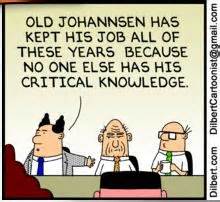What Value Do You Place On Your Tribal Knowledge & Experiences?
Today we live in the information age where a few simple mouse clicks and keyboard taps will deliver information, but what good is that information when you don’t know how to use it or it doesn’t possess prior working knowledge. Companies turn over their workforce without giving much thought as to what tribal knowledge they are losing each time they lose an employee for whatever reason.
Once an employee walks out that door and there is no one possessing that critical knowledge, contacts, experience, or skills needed for a particular job, then that company experienced tribal knowledge loss that will be difficult to replace any time soon. Losing a key employee that has vital company information can result in a 20% to 35% loss in productivity in the form of reduced sales, diminished customer service, and additional stress on the remaining work force.
General Mills Inc., for example, has estimated that the departure of just one experienced marketing manager could cost millions of dollars from the loss of critical marketing and client knowledge.
When employees leave, they take vital knowledge with them. Without a process in place to capture that knowledge and transfer it to their successors, it winds up lost forever. The cost to those organizations can be crippling in a number of areas and not just financial. As a result, those who follow them in the job take a longer time to get up to speed, important discoveries and insights disappear, and the company’s ability to act quickly and intelligently is crippled.
Although largely intangible and very often difficult to measure, intellectual capital or Tribal Knowledge is now widely regarded as a true capital expense for a company. The reason for this is because the investment in, and replacement of, employees is similar to the capital investment required to purchase machinery, plants, technology and software. At the same time, the education and training expenses incurred in maintaining the performance of “human assets” are equivalent to the depreciation of physical assets.
With this in mind, there is a paradigm shift today in how companies are thinking about how they treat the collective knowledge, wisdom, experiences, tribal knowledge and intellectual capital that resides within their organization. These are valuable corporate assets, and companies can no longer ignore the impact they have both on their day-to-day operations as well as their bottom line.
In many cases, executives have no idea what knowledge they are losing or from whom and from where. It’s just one of those things that people don’t think about as a problem until it hits them and impacts the whole organization. A friend of mine has a client who moved their manufacturing operation from Illinois to Wisconsin. When they moved, they lost of lot of employees who didn’t want to move with them for a lot of reasons. When the manufacturing company attempted to recruit employees in Wisconsin, they realized all too late that the skill sets they needed to run their business wasn’t available in their area. Whatever capital gains they thought they had by moving there were lost due to their inability to find employees who were trained in the skill sets they needed to run their business and unfortunately for them, they didn’t plan ahead and retain the knowledge sets they needed to pass on to the new employees.
Capturing your tribal knowledge and experiences can also reduce the ramp-up time for new hires and get them up to speed faster. This especially helps sales organizations by leveraging what they know about selling to their target market.
If your organization doesn’t have a plan or a process in which you capture and store your tribal knowledge and experiences then you clearly are putting your whole organization in jeopardy. At least that’s the way I see it, what say you?
About the author:
Chuck Carey is an accomplished sales, marketing and business executive with more than 40 years of experience in the information technology industry. Chuck’s vast knowledge of the problems facing all types of organizations around identifying and capturing corporate knowledge makes him ideally suited to work with and consult in that area. If you would like to see if Chuck can help you and your organization please contact him through this website.


